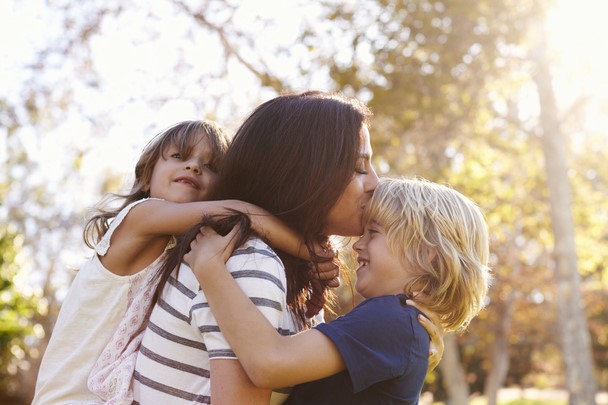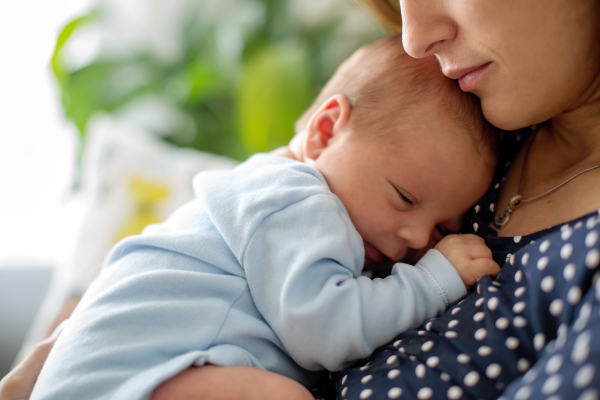Having a baby can be one of the most exciting and rewarding times in someone’s life. But it can also be one of the most isolating and loneliest too.
New research from British Association for Counselling and Psychotherapy (BACP) has revealed that as many as three in five (62%) parents who’d had a child within the last 12 months say that loneliness has negatively impacted their mental health and wellbeing.1 To mark World Maternal Mental Health Day (7 May 2025), BACP therapists share their insights on perinatal loneliness and their tips on how to cope with it as a new mum.
A new identity
Registered counsellor and Mum Therapy’s Helen Hazell-English, who specialises in supporting mums and mums to be, says that even those who are surrounded by supportive people can feel isolated because it is a period of personal transition. And although there’s lots of commonality, no two women will have the same experience.
“Becoming a mum is an abrupt gear change,” shares Helen. “Loneliness is very common for new mothers. They can feel lonely as their identity shifts. Motherhood confuses and challenges us and causes personal growth - making it tricky at times to even know ourselves as we once did. Being around others while we feel a bit awkward and unsure in ourselves can feel difficult.”
Accredited therapist Sarah Wheatley of Birth and Beyond agrees and says that many new mums don’t feel able to share their feelings with others – “possibly due to shame and because they’re scared of how others may react,” shares Sarah. “They can also feel 'out of synch' with the important people in their lives. A lot of new mums also report feeling invisible and easily missed due to their identity changing.”
Shame
“As a species we are social creatures, designed to connect with others – we feel safer when we are,” shares Sarah. “Feeling disconnected can make us feel less safe physically and emotionally. It can cause us to doubt our sense of worth.”
New mums experiencing loneliness may also face mental health challenges such as low mood and anxiety. Helen says that depression, anxiety, stress, anger, parental burnout, low confidence and low self esteem, are commonly associated with loneliness in motherhood and frequently seen in her practice. “Shame thrives in isolation,” says Helen. “Unhealthy thought patterns and behaviours can continue in a closed feedback loop in our own heads - such as obsessing about nap schedules and feeling like a failure. It can be especially painful if feelings of loneliness evoke another difficult time in our lives - such as social difficulties at school, social anxiety associated with neurodivergence or your own parental neglect.”
Isolation and overwhelm
Accredited therapist Heidi Soholt says that a lack of support can also lead to feelings of isolation and overwhelm, which can leave new mums feeling unable to cope. “Women who are unsupported can be more prone to burnout,” shares Heidi. “Loneliness can exacerbate sleep issues amongst women who are already sleep deprived from caring for their baby. Lack of sleep is linked to a host of mental health issues including emotional regulation, decision-making and ability to manage stress.”
Tips to combat loneliness as a new mum:
- Dial down the pressure to find new best mum friends – Helen suggests that instead of trying to find a new set of best friends look for ‘mum colleagues’ instead, as may be a less stressful way to think about it. “Friendship takes time to develop. It can feel overwhelming getting to know new people while figuring out so much about yourself and motherhood,” shares Helen.
- Check your social battery – If you’re in the grips of loneliness as a new mum, Helen suggests asking yourself: how much energy do you have for socialising today? “If it’s low, you don’t have to isolate (unless you want to). Sometimes running an errand or taking baby to a cafe and simply being among others can alleviate loneliness. A quick call with a loved-one or putting the radio can help you feel connected to people if you can’t get out.”
- Practice self care - “Don’t let your needs fall to the bottom of the list,” asserts Helen. “Never underestimate the impact of sleep-deprivation. You need to be abundantly kind and gentle with yourself. Don’t trust any negative thoughts about yourself.” Helen suggests connecting to the world through music, tv and film, nature, creativity, comedy, interests, and pets. “Whatever feels good and helps you get out of your head,” she says.
- Share how you’re feeling – Talking to a trusted loved-one or counsellor can help put things into perspective and get to the root cause of your feelings. “Warm support starts to dissolve loneliness and any shame,” shares Helen. “Sometimes talking to someone may make you realise that what you thought was loneliness is actually more about something else for you such as unexpressed grief.”
- Seek connection – Connecting with a wider community of mothers can be really helpful, suggests Helen: “Crucially it normalises mixed feelings about motherhood to help you remember it’s challenging and somewhat lonely for everyone.” Helen suggests attending groups/classes in real-life or online, reading motherhood memoirs, reaching out to people via social media and talk to experienced mothers in your family/friends or community about how things were for them. Sarah suggests that if you are shy and find in person mother and baby groups daunting, consider taking someone else with you or look for supportive online groups or forums that might feel less hard to join in.
“It might sound weird, but try to go to the shops, library, for a walk at roughly the same times and places each week,” adds Sarah. “You are more likely to start bumping into the same people each time (and not just other people with babies). That sense of recognition, however small, can help increase our sense of connection and belonging.”
- Take tips from lockdown – Sarah suggests having zoom drinks in the evening or even sharing links to things online with friends can help alleviate loneliness. “Find ways of connecting that don’t necessarily need to be in person if it’s too hard to leave the house,” says Sarah.
- Talk about loneliness before baby arrives – “If possible, talk about the likelihood of loneliness with the people who matter to you from before you give birth,” shares Sarah. “We can feel so ashamed of feeling lonely (as if it somehow reflects something about our worth) when this is, actually, a result of our changing situation. Addressing the issue directly can help us access the support we need. And the reason I suggest talking about it before the baby is born, is because it can feel harder to do when you are already feeling vulnerable.”
- Get curious about what feeling lonely evokes in you - “You might notice that your loneliness stirs up shame or self-criticism, or reminds you of difficult past experiences. These stories that we tell ourselves add an extra layer of suffering,” explains Helen. “Ask yourself compassionately what might help you shift these old stories or help you practice kinder alternative perspectives. You are the expert in you, but some ideas include journaling, creative/embodied/meditative/spiritual practices, thinking of what you would say to your child in the same position, reading an inspiring or self-help book, peer support groups, counselling or taking an online course.”
- Monitor your social media use – Helen says that social media use is often mentioned by her clients and has a significant impact on how they feel about themselves and their parenting. “Keep an eye on how much you scroll social media,” says Helen. “It can be a wonderful source of human connection but it can also exacerbate loneliness. Curate social media feeds carefully so that they nourish you - i.e you are viewing content that is supportive/inspiring/fun.”
To find a trained and registered therapist who can help with perinatal loneliness, please visit BACP’s Therapist Directory.
References
[1] BACP’s annual PPS survey measures the opinions and attitudes of the British public towards mental health. The survey data was collected using a self-complete, online methodology. A nationally representative sample of 5,150 adults (aged 18+) was taken from YouGov’s online research panel and results were weighted to provide a nationally representative dataset. Fieldwork for the 2025 survey was conducted between the 13th February and 4th March 2025.

Struggling with the pressures of parenting? The experts share why parenting is so hard right now and their tips on how to cope
Ahead of Parent Mental Health Day, our therapists share what you can do to make it easier and more enjoyable.

“The perfect mum is a myth”: Seven therapists’ tips to help first time mums
Our members share top tips for first time mums who may be feeling overwhelmed

Our call for new mums to have access to counselling provision
We respond to a report into the provision of specialist perinatal mental health services in the UK
